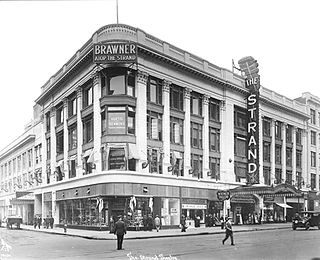Strand Theatre (Manhattan)

The Strand Theatre was an early movie palace located at 1579 Broadway,[1] at the northwest corner of 47th Street and Broadway in Times Square, New York City. Opened in 1914, the theater was later known as the Mark Strand Theatre,[2] the Warner Theatre, and the Cinerama Theatre. It closed as the RKO Warner Twin Theatre, and was demolished in 1987.
History
The Strand Theatre was built in 1914 as part of the chain of movie theaters owned by the Mark Brothers, Mitchel and Moe. It cost US$1 million (equivalent to $30,418,605 in 2023) to build and is believed to have been the first lavish movie palace built only to show motion pictures. It was designed by Thomas W. Lamb and served as a model for many other similar theaters built at the time. The New York Times favorably reviewed the opening of the Strand, helping to establish its importance. To manage the theater, Mitchel Mark personally hired Samuel "Roxy" Rothafel. Rothafel developed his luxurious style of presenting films at the Strand which he later perfected at the Capitol and Roxy Theatres, becoming the best known motion picture showman in New York City.[3] The theatre influenced The Strand in Hobart, Tasmania, which was initially intended to be a replica of its New York namesake.[4]
The theatre was under contract and mostly showed films distributed by Paramount Pictures.[5]
In 1928, the Mark Strand became the Warner Strand when Warner Bros acquired the theatre to showcase its films on Times Square. It was eventually renamed the Warner Theatre in 1951. After closing for renovation in 1952, the theater reopened as the Warner Cinerama Theatre in 1953 with the widescreen film This Is Cinerama (1952). The Warner was the primary New York home of Cinerama films during the remaining years of the 1950s and in 1963 installed an even larger screen to present such 70mm films as It's a Mad, Mad, Mad, Mad World (1963).[citation needed]
In 1968, the theater was converted into three separate cinemas by RKO Stanley Warner Theatres. The 1,000 seat Warner Cinerama now occupied the original theater's main floor. The 1,200 seat Penthouse Theatre occupied the former balcony and the Cine Orleans was created in the stage house of the old Strand, entered from 47th St. The Cinerama and Penthouse were renamed again in the 1980s as the RKO Warner Twin. The entire building closed on February 8, 1987. It was demolished to make way for the Morgan Stanley Building, part of the redevelopment of Times Square.[1]
Memorable films that had their New York premieres at the Strand include Captain Blood (1935) starring Errol Flynn and Olivia de Havilland.[6]
References
- ^ a b "Strand Theatre". Cinema Treasures. Retrieved 2010-06-26.
- ^ "The Stage Door" New York Tribune 1919-10-17:11 col. 7: "All the Strand theaters in the country, which are controlled by the Mitchell [sic] H. Mark Realty Company, will from now on be known as Mark Strand Theatres. There is one in New York at Forty-seventh Street and Broadway."
- ^ Reviews of the opening:
- "New Strand Opens; Biggest of Movies" The New York Times 1914-04-12
- "Strand Theatre is Model Home for Photo Plays" The Evening World 1915-07-14:16 col. 7
- "Events of the Films: Broadway Likes Motion Pictures" New York Tribune 1914-04-19, Part III:9 col. 1
- "Million-Dollar Theatre Opens" The Motion Picture News Vol. 9 No. 15 (1914-04-18):23
- Bush, W. Stephen "Opening of the Strand" The Moving Picture World Vol. 20 No. 4 (1914-04-25):502
- "Strand's Big Start" Variety Vol. 34 No. 7 (1914-04-17):20
- "Strand Theater Opens" The New York Dramatic Mirror Vol. 71 No. 1843 (1914-04-15):31 [non-permanent link]
- ^ McIntyre, Paul (9 November 2015). "The history of Hobart's Odeon Theatre, the 'finest building in Tasmania'". Australian Broadcasting Corporation. Retrieved 10 May 2022.
- ^ Terry Ramsaye (January 1925). "The Romantic History of the Motion Picture". Photoplay. p. 120. Retrieved 2018-04-28.
- ^ Brown, Gene (1995). Movie Time: A Chronology of Hollywood and the Movie Industry from Its Beginnings to the Present. New York: Macmillan. p. 125. ISBN 0-02-860429-6.
Further reading
- Bloom, Ken (2004) "Strand Theater" Broadway: an Encyclopedia (New York: Routledge):504
- Bush, W. Stephen "Opening of the Strand" (different from piece above in References) The Moving Picture World Vol. 20 No. 3 (1914-04-18):371
- Forsher, James (2003) Chapter 6: "Roxy" The Community of Cinema (Westport, CT: Praeger):39f.
- Melnick, Ross; and Fuchs, Andreas (2004) Chapter 2: Birth of the Palaces, 1913-1919 Cinema Treasures (St.Paul, MN: MBI):25f.
- Melnick, Ross (2012) "Strand Theatre, New York, NY" American Showman (New York: Columbia University Press):94f
- Ramsaye, Terry (1926) Chapter 67: "Roxy" Comes to Broadway A Million and One Nights: A History of the Motion Picture (Simon & Schuster; book has no page numbers)
- Reynolds, Walter "Don't Give the People What They Want" The Green Book Magazine Vol. 12 (1914-08):225
- "The Strand Theatre in New York" The Theatre Vol. 23 No. 184 (June 1916):369. Article on how Rothapfel runs the theater
External links
- Strand Theatre at CinemaTreasures.org
- "Strand Theatre, New York City, New York - January 28, 1915" (theater program). The Silent Film Still Archive. Mitchel H. Mark Realty Corporation. January 28, 1915. Retrieved February 9, 2014.
- "Strand Theatre, New York City, New York - November 14, 1915" (theater program). The Silent Film Still Archive. Mitchel H. Mark Realty Corporation. November 15, 1915. Retrieved February 9, 2014.
- Museum of the City of New York photographs:
- New York Public Library photograph: "Night view". NYPL Digital Gallery.
